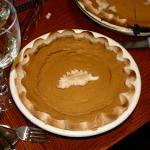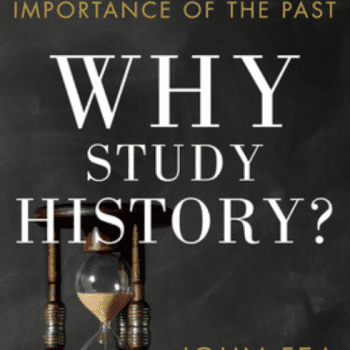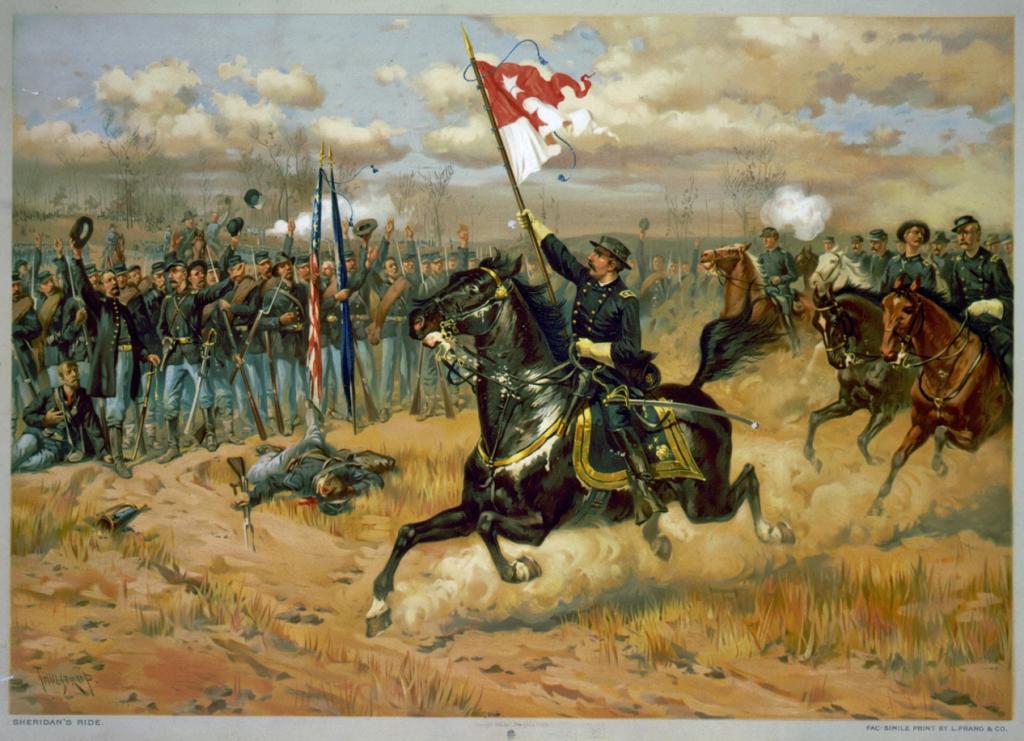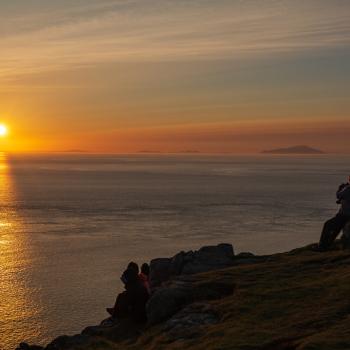From my archives, with a bit of updating.
I love turkey. And cranberries. And pumpkin pie.
And parades and football and all the other trappings of Thanksgiving.
But this year, I again need more than trappings.
I need to be reminded why Thanksgiving is the one festival of American civil religion that Christians ought to embrace with little hesitation. I need to remember that, as it was originally conceived, Thanksgiving was bound up with three virtues: gratitude, but also humility and empathy.
Gratitude
You might already know that it was Abraham Lincoln who first encouraged Americans “to set apart and observe the last [now, fourth] Thursday of November… as a day of thanksgiving and praise to our beneficent Father who dwelleth in the heavens.” It was 1863, and Lincoln celebrated that, even in the middle of “a civil war of unequaled magnitude and severity,” the Union had enjoyed a significant degree of peace and prosperity. “No human counsel hath devised nor hath any mortal hand worked out these great things,” wrote the president. “They are the gracious gifts of the Most High God, who, while dealing with us in anger for our sins, hath nevertheless remembered mercy.”
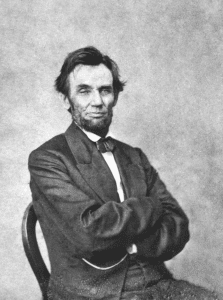
Responding to grace with gratitude ought to come naturally to a Christian historian, since giving thanks is one way that we make meaning of the past. Indeed, C.S. Lewis believed that gratitude was the virtue most naturally associated with the past.
But instead, I continue to spend far too much of my time thinking about the future, and feeling none too grateful.
Perhaps a devil has been sitting on my shoulder, implementing the advice that Lewis’ Screwtape gave to Wormwood: “[m]ake humans live in the Future. Biological necessity makes all their passions point in that direction already, so that thought about the Future inflames hope and fear. Also, it is unknown to them, so that in making them think about it we make them think of unrealities.”
Left to myself, I’d continue in a futile quest for knowledge of such “unrealities.” But like All Saints’ Day, Thanksgiving is a “temporal milestone” that stops short our rush into the imagined future and reminds us to linger a while in the experienced past.
I don’t want to make this holiday sound cheerier than it is. For many, Thanksgiving is a day that’s endured more than enjoyed, as it dredges up memories of conflict and loss. At some point Thursday, for example, tears will come to my eyes as I think about my grandfather, whose death this June led to the sale of the family farm where we spent many a holiday together.
But gratitude (as Lewis would surely say) is about joy, not happiness or pleasure. Writing last year about Hillary Clinton and Henri Nouwen, Kristin observed that “gratitude involves a conscious choice, a choice one can make even in the midst of pain and resentment.”
Humility
But there is more to Thanksgiving than giving thanks. Much as I need to be reminded of the importance of gratitude, even amid sorrow and suffering, the history of the holiday takes us still deeper.
Having already stated that God responded to their sins with mercy rather than anger, Lincoln’s 1863 proclamation next exhorted Americans to adopt a spirit of “humble penitence for our national perverseness and disobedience….” This after he had earlier called for several “days of public humiliation, prayer and fasting,” an example of how “a vocabulary of corporate repentance and renewal, handed down from the Puritans, remained an appropriate vocabulary for addressing the American public about its privileges and duties before God” (Mark Noll, The Civil War as a Theological Crisis, p. 18).
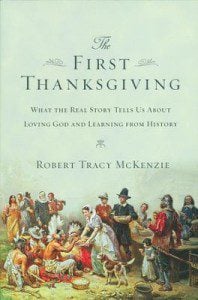 In fact, this vocabulary goes back to another group of Calvinists, the one we associate with Thanksgiving. As Tracy McKenzie points out, the Protestant Separatists we know as the Pilgrims held at least three “days of humiliation and fasting” during their time in Holland, only celebrating “the first thanksgiving” after arriving on these shores.
In fact, this vocabulary goes back to another group of Calvinists, the one we associate with Thanksgiving. As Tracy McKenzie points out, the Protestant Separatists we know as the Pilgrims held at least three “days of humiliation and fasting” during their time in Holland, only celebrating “the first thanksgiving” after arriving on these shores.
“Humiliation” grates harshly on the ears of 21st century persons, who hear it as the deprivation of individual dignity. But here’s how an early 19th century edition of Webster’s defines that word:
The act of humbling; the state of being humbled.
1. Descent from an elevated state or rank to one that is low or humble…
2. The act of abasing pride; or the state of being reduced to lowliness of mind, meekness, penitence and submission.
If you ask the columnist David Brooks, not a few Americans could stand to be “humiliated” in this way. Even if he paints with too broad a brush in The Road to Character, when he describes the extent of narcissism in American society by contrast to a rather rosy view of earlier eras, I’m convinced that he’s right to place humility — rather than “being true to yourself” — at the center of character formation.
Here too, there’s a natural connection with the practice of history, which McKenzie says “[reminds] us of our own limitations” and serves as a check on the ways that “our self-love latches on to our thinking and further distorts what we see, causing us to view the past in self-serving, self-justifying ways” (The First Thanksgiving, p. 123).
But here too, this historian falls short. Faced with the temptation to offer click-worthy explanations for the extraordinary developments in our country’s recent political history, I could use the wisdom that Brooks says flows out of humility: “…the moral quality of knowing what you don’t know and figuring out a way to handle your ignorance, uncertainty, and limitation” (The Road to Character, p. 9).
Empathy
Brooks associates humility with gratitude, quoting Michael Ramsey’s statement that “Thankfulness is a soil in which pride does not easily grow.” But I’m also struck that Lincoln added a third virtue in the conclusion of his 1863 proclamation. In addition to urging prayers of gratitude to God, he recommended that Americans, out of the aforementioned spirit of “humble penitence,” also
commend to His tender care all those who have become widows, orphans. mourners, or sufferers in the lamentable civil strife in which we are unavoidably engaged, and fervently implore the interposition of the Almighty hand to heal the wounds of the nation and to restore it, as soon as may be consistent with the divine purposes, to the full enjoyment of peace, harmony, tranquillity, and union.
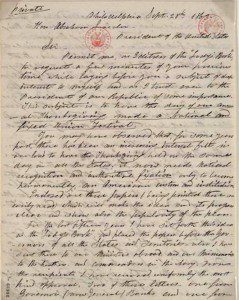
What he urged was empathy, another favorite word of historians — and one that’s often been exhorted and debated in our current season of “lamentable civil strife.”
But what I often miss when I use the word myself is that empathy, as Lincoln seemed to understand it, started with contemplation but led to action. In a still more famous address that also confessed national sins before the eyes of a God whose judgments “are true and righteous altogether,” he later revisited several of the themes of his Thanksgiving proclamation and urged his fellow citizens to
strive on to finish the work we are in, to bind up the nation’s wounds, to care for him who shall have borne the battle and for his widow and his orphan, to do all which may achieve and cherish a just and lasting peace among ourselves and with all nations.
This was Lincoln’s “charity for all” — not merely a transient emotion or fleeting insight, but an empathetic commitment to serve others.
* * * * *
So this Thanksgiving, enjoy the turkey, cranberries, and pumpkin pie. For all my talk of “humble penitence,” it’s long been a feast, not a fast. As early as 1864, the second “national day of Thanksgiving,” a Washington newspaper was already reporting on “that estimable feature of the occasion, the Thanksgiving Dinner, which sent up its appetizing odor throughout the length and breadth of the city.” And Ron Chernow’s new biography of Ulysses Grant reminded me that some 80,000 pounds worth of turkeys were donated to feed the Union troops besieging Petersburg.
But don’t stop there. Let this Thursday be something more like what Abraham Lincoln had in mind: an occasion to turn away from the future and choose to remember the past year with gratitude, to turn away from pride and see your limitations more clearly, and to turn away from selfishness and recommit to service and reconciliation.


